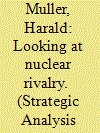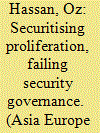| Srl | Item |
| 1 |
ID:
133601


|
|
|
|
|
| Publication |
2014.
|
| Summary/Abstract |
The 100th anniversary of World War I is a reminder of the risks of great power politics. The current dynamics of world politics rest on the relations among the US, China, Russia and India, and their interlocking relations with friends and enemies in a region that extends from the Gulf to the Japanese archipelago. A naval and nuclear arms race is underway that reflects these complex relationships. One of the numerous disputes could spread conflict across the whole region. This risk includes the nuclear factor. A three-pronged effort including political detente, arms control and nuclear disarmament is needed to defuse these dangers, which will otherwise continue to grow.
|
|
|
|
|
|
|
|
|
|
|
|
|
|
|
|
| 2 |
ID:
078256


|
|
|
| 3 |
ID:
121576


|
|
|
|
|
| Publication |
2013.
|
| Summary/Abstract |
In 2003, the European Union declared the threat of weapons of mass destruction 'potentially the greatest threat to our security' and increasingly called for the issue of nuclear proliferation to be managed within its preferred multilateral security governance frameworks. In spite of this, and the increased securitisation of proliferation, the EU has fundamentally continued its historical record of failing to engage with India and Pakistan's nuclear rivalry, and has not been able to move significantly beyond a relationship with South Asia based on trade and aid. This is deeply problematic given the regional instability posed by the Indo-Pakistani enduring rivalry, and the fact that Pakistan is not only an unstable nuclear weapons state, but has been known to harbour international terrorists and nuclear proliferators. Given these conditions, as the EU acknowledges, the stakes of failing to engage could not be higher. A deeper analysis of EU engagement, however, demonstrates that EU security governance is limited, ineffectual, inconsistent and largely perceived as neo-colonial in what is the world's most likely nuclear flashpoint. If the EU is to be considered a global actor in security governance, a key objective of the Treaty of Lisbon, then this needs to be redressed.
|
|
|
|
|
|
|
|
|
|
|
|
|
|
|
|